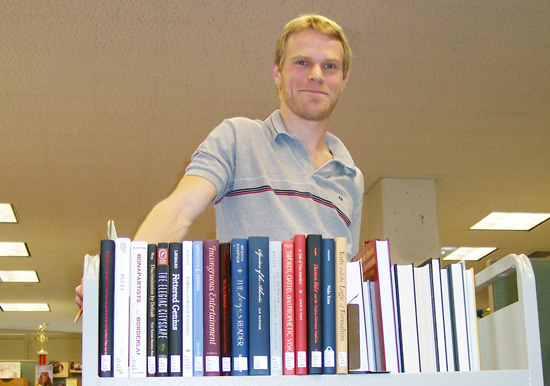Library Assistant Gets the First Look at New Books
 |
| Trevor West, library assistant in acquisitions, orders, receives and accounts for the materials added to Wesleyan’s main library collections |
| Posted 03/01/06 |
| Q: When were you hired at Olin Library as a library assistant in acquisitions?
A: I began on January 31, 2005. Q: What libraries on campus do you order books for? A: I place and receive orders for the Art Library, the Science Library, and the Olin Library, including the Scores and Recordings collection, and reference materials for the Special Collections and Archives. Q: What is the purpose of the librarys Acquisitions Department? A: Working in direct collaboration with the collection development librarian, the Acquisitions Department orders, receives and accounts for the materials added to Wesleyan’s main library collections. Q: What are your key responsibilities as a library assistant? A: My responsibilities include bibliographic record transfer or creation for requested monographs, order record creation, the research of availability and publisher information and monograph gift processing. Q: If a professor, for example, requests a particular book for the Art Library, what is the process of getting this publication to the library? A: First I must make sure that there is accurate bibliographic material for the title to be located. This may require some online research. In what country the book has been published and when, whether the particular book is an exhibition catalogue, a dissertation, or a collection of essays, these are a few of many factors that will determine which vendor will receive our purchase order. The order is marked RUSH to ensure a priority shipment. I unbox the shipment when it comes in, verify the contents against the invoice, and locate the purchase order for the item at my computer. I then verify that the book has the proper title and edition requested, mark the professor’s name, e-mail and campus address on a slip placed in the book and send it off to the library cataloguers. Once through the cataloguers, the book is sent to marking and shortly thereafter the professor is notified that his or her request is ready to be charged. Q: How are acquisitions paid for? A: There is a substantial budget allotted annually to the Acquisitions Department. A smaller portion of library acquisitions is provided by gifts and donations, often from Wesleyan professors and students. Q: How do you spend most of your day? A: Most of my day is spent at the computer, however the best part of my day is spent at the receiving table opening recently boxed shipments of books I’ve ordered. Q: That must be exciting. A: There’s a great satisfaction unboxing book shipments at the receiving table. Having the first look at all of the new books is very cool. Q: Can you mention a few examples of recent acquisitions? A: Regularly I receive well over a hundred monographs each week, but I’ll name just a few of the most recent ones. I also recommend these books to be enjoyed after I return them! Saga: The Journey of Arno Rafael Minkkinen, Thirty-five years of Photographs; The Best Early Stories of F. Scott Fitzgerald; Stanley Kubrick: Drama & Shadows: Photographs 1945-1950; Come on in!: New Poems by Charles Bukowski; Pizarro: Conqueror of the Inca; The Complete Stories of Truman Capote; Hanging Captain Gordon: the Life and Trial of an American Slave Trader. Q: Is your job here challenging? A: Yes, I find my job here to be very challenging, but I enjoy it immensely. Q: Who are the key people you work with in the Acquisitions Department and where are you located in the library? A: Ed Allen is the Collections Development librarian, JoAnn Dootson is our bookkeeper, Q: Where did you attend college? A: I attended Connecticut College and I have a bachelor’s degree in English with Q: What led you to work in a library acquisitions type field? A: I worked at the Charles E. Shain Library at Connecticut College during my undergraduate education. I have also worked in the main corporate medical library of a major pharmaceutical company in Manhattan, and in the Mary Cheney Public Library of Manchester, Conn. I’ve always loved libraries, but for me nothing compares to working in a private university environment. Q: Since you work in a library, I would assume you like reading. Do you? A: Yes, I love to read. When I’m not working, in class, or reading, I am at work framing art. I worked full-time as a fine-art custom framer’s apprentice in lower Manhattan five years ago and have continued my interest in archival framing with private consulting here in Connecticut. Q: You’re also enrolled in the Graduate Liberal Studies Program. A: Being a student, I’m able to continually remind myself how necessary and beneficial my professional duties are to my education. |
| By Olivia Drake, The Wesleyan Connection editor |

